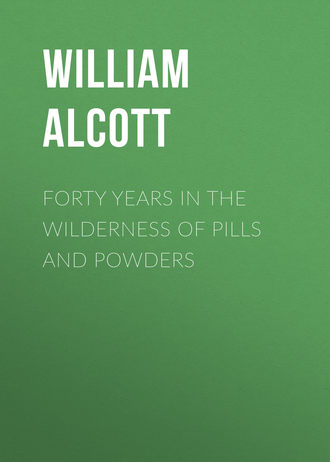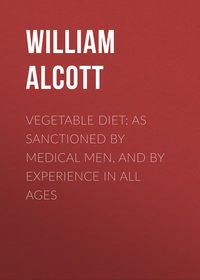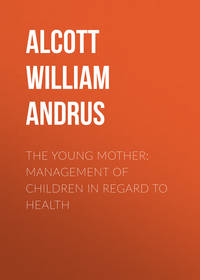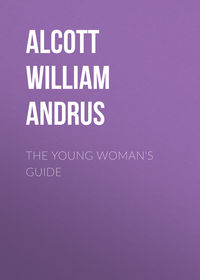 полная версия
полная версияForty Years in the Wilderness of Pills and Powders
"During a part of the time of my principal experiment, I kept a grocery. On leaving this, I established a Graham boarding-house, in which I continued for one year.
"About a year after the termination of my experiment, I had occasion, for about three weeks, to work in a bake-house, where the mercury in the thermometer was at 90°. While here, I ate twelve ounces of dry bread and two apples a day, and drank nothing. Yet I perspired as freely as ever, nor did I perceive any difference in the quality or the quantity of any other secretions or excretions."
The reader will take notice that Mr. Robinson's principal or starvation experiment, lasted five months, or one hundred and fifty days. He will also observe that he left off the experiment with nearly or quite as much flesh as he had when he commenced, and with a very great increase of muscular strength.
The above statement was so remarkable, that not a few medical men and others regarded it as a hoax. "To live on three ounces of bread, and yet be in daily employment," they said, "even though such employment were of a kind likely to call for very little muscular effort, is altogether incredible. And what renders the whole so much more unlikely, is, the yet more extraordinary assertion, that, part of the time, he gained more in weight than the whole amount eaten and drank."
It was no wonder that medical and all scientific men were staggered at the account. I was in doubt myself, in regard to the functions of waste, and made a very rigid examination, in order to be certain of the facts, before I ventured to publish any thing. On one or two points, I afterward obtained Mr. Robinson's particular statement, as follows: —
"In regard to the question you propose, I shall have to guess a little. So far as the fluids are concerned, however, I think it was about half a pint a day. The solids – for I weighed them this morning, and they appear to me about equal to those voided during the experiment – are fully half a pound."
I also recently ascertained another curious fact. Mr. Robinson's eyesight, prior to the experiment, had, for many years, been very poor, but was perfectly restored during its progress. It appeared, also, that he had again resorted to the exclusive use of bread and water for food; but not in such small quantities as before. Mr. Robinson, of course, is now above sixty years old.
One medical correspondent of the Boston Medical and Surgical Journal, pressed Mr. Robinson, very hard, for corroborative testimony concerning the facts just stated, to which Mr. Robinson very kindly replied, by sending him the certificate of his wife, Mrs. E. D. Robinson, whose veracity is undoubted. The certificate was as follows: —
"The most of the facts which my husband has written, I well recollect, and will give my name as a voucher for the truth of them."
A brother of Mr. Robinson, at Holmes' Hole, whom I called on, appeared to give full credence to the statements of the latter, although he was much opposed to the experiment, at the time it was made, and mortally detested all his bread and water tendencies.
I will only add, that a medical man who was sceptical in regard to the whole matter, became finally convinced that the story bore the marks of truth, and made public his conviction, in the subjoined statements and reasonings.
"It is no true philosophy to refuse credence to a statement of fact supported by competent evidence, simply on the ground that we cannot understand how it can be. That his system (Robinson's) absorbed a very considerable amount of weight from the moisture at all times existing in the atmosphere, I have no doubt – partly through the skin, but chiefly, as I apprehend, through the mucous membrane of the lungs. The fact that they are capable of transmitting such an amount of water in a very short time, as may be rendered evident by breathing on a cold, polished surface, is a pretty conclusive proof that they may, under favorable circumstances, be as active in absorption.
"That the alvine evacuations are purely and entirely a secretion, to become an excretion, I have been satisfied for a number of years; and I am glad of this new and striking – I might say incontrovertible – proof that it is so. To be sure, all matters incapable of solution and digestion, pass off through the alimentary canal, but they are purely accidental. One of the most satisfactory proofs, to my mind, of the fact, has been the discharges from the bowels of a healthy infant. The whole of the milk is so digested that there is no residuary matter to pass through the canal, and yet the discharges are abundant."
The case of Mary B. Adams, of Oakham, Mass., though differing considerably from that of Mr. Robinson, is, nevertheless, remarkable. I have dwelt so long on the preceding case, however, that I must study brevity. What I shall say, was published in the papers of some years since, and is from her own pen.
"In June, 1840, I had an abscess in my throat, accompanied by slow fever, and in the fall, dysentery. In the autumn of the same year, I discontinued the use of animal food.
"In 1842, I had an attack of spinal complaint, which lasted me three months. In the spring of 1843, I had lung fever, followed, for nearly two years, by a cough, and accompanied by a very indifferent appetite. A piece of bread three inches square and one inch thick would serve me for a meal. A hard fit of coughing, however, was sure to follow every meal. I also became very much emaciated. In the fall of 1844, I took some medicine which removed my cough.
"Through the winter and spring of 1845, I had diarrhœa; and in the last of May, I was suddenly and completely prostrated. I had risen in the morning more unwell than usual, but before flight I was suffering intolerable pain through the kidneys and back; and it was not till the lapse of two weeks that I was able to walk about the house. All this while I was entirely destitute of an appetite, though my stomach continually craved acids. For six months, I lived almost wholly on fruit. Four good-sized apples a day,13 was all that I required. My drink was, for the most part, catnip tea. Sometimes I could take sugar and milk in my tea; at others, milk could not be borne. I drank four teacupfuls of it a day.
"While I was at one period expectorating largely, I had custards made from the white of eggs, sweetened with loaf sugar, of which I took three table-spoonfuls, every twenty-four hours. I slept but little – not more than two hours in twenty-four… My bowels were very costive; I do not suppose there were more than two or three natural evacuations during the whole of the six months I am describing."
A more particular account of her diet, in 1846, is elsewhere given. It is in the following words: "During this year I took but little food, and that of the simplest. I lived chiefly on fruit, such as apples, currants, strawberries, gooseberries, and blueberries, and other acid fruits."
Some years later than this, Miss Adams was still living very simply. "My food," she says, "is raised bread, and butter, apple or pumpkin pie, and fruit in small quantity. I do not require more than a third as much food as most females. In fact, I can eat but little of any thing. My food, even now, distresses me very much, unless I vomit it. I eat no animal food, and roots of every kind distress me. I drink tea; I cannot drink water; it seems, in swallowing it, more like a solid than a liquid."
There would be no difficulty in adding largely to the list of cases of dyspepsia which have been cured on the starvation plan; but these must suffice for the present chapter.
CHAPTER XCI
DIETING ON MINCE PIE
A recent letter from a patient of mine, contains the following statement: "I met, yesterday, with a poor dyspeptic. He said he felt very bad indeed, and that he had been dieting for a long time. I asked him what his diet had been. He said 'Bread and butter, for the morning meal; beef, etc., for dinner; and nothing at all, for supper, but a piece of mince pie and one or two glasses of cider.'"
Admitting this to be dieting, it is, at least, such a kind of dieting as will not be likely, very soon, to cure dyspepsia. And yet to hundreds, if not thousands, dieting is little more than an increased attention to what they eat – I mean, from meal to meal. Yet no changes of food, even for the better, will compensate for this increased watchfulness over – I might perhaps say devotion to– the stomach. The Philippians, to whom Paul wrote so touchingly, are not the only people in the world whose god is their abdominal region. Such an anxious attention to the demands of an abnormal appetite, only tends to increase that determination of blood to the stomach, to prevent which all judicious or effective dieting is intended.
Dyspepsia only renders her devotees – her very slaves – the more enslaved. With such, every attempt to cure the disease by dieting is still stomach worship. They must have their very medicine taste agreeably and sit well. At all events, they must and will have their minds continually upon it, and must and will be continually inquiring whether they may safely eat this article or that or the other.
It would be almost true to affirm that the fall of man from primeval integrity, consists essentially in dyspepsia, and that every descendant of Adam and Eve is a dyspeptic. The attention of mankind generally, is directed too exclusively as well as too anxiously, to the inquiry, what they shall eat, and what they shall drink. That we must eat, and drink too, is quite obvious – nothing more so. That the Author of nature intended, also, that we should take pleasure in our eating and drinking, is scarcely less so. But does he secure to himself the most pleasure who thinks most about it? Most certainly there is pleasure —much pleasure in the anticipation of good. We may, by aid of imagination, then, feast upon the same dish half a dozen times. Yet, does not this – I repeat the idea – tend to determine an increased amount of blood and of nervous energy to the stomach, and to aggravate the disease? Let the reader ponder this question.
My own most deliberate conviction is, that the stomach, in general, is best managed, and the greatest amount of gustatory enjoyment secured, when it is subjected most fully to good habits; that this organ, being blind and deaf, is best served when directed by the wiser head; or, to express the same truth in a better way, instead of asking the stomach at any time what it will have, we should ask the head what is right, and follow its directions. If the stomach is pleased, why, very well; if not, let it go without being pleased. Give it what you think is right, all things considered, and think no more about it. If it rebels, give it a smaller quantity. If it still complains, lessen still more the quantity, and perhaps diminish the frequency of your meals. There is no danger of starving to death, as every one must be convinced who has read carefully the two preceding chapters. When the system is really in a suffering condition for want of nutriment, then the stomach will be able to receive more, and dispose of it. If you give it what is right for it, there will be no want of appetite – at least, very long. Nay, more; the mere animal or gustatory enjoyment of that food which the head tells us is right, and to which we conscientiously adhere, will, in the end, be far greater than in the case of continual inquiry and anxiety and anticipation and agitation about it.
Dyspepsia, I know, has a great variety of causes – as many, almost, as it has forms. And yet I do not believe it can often be induced by other causes alone, as long as the stomach is treated correctly. Give to that organ, habitually, what is exactly right for it, both as regards quality and quantity, and I do not believe we shall hear any more, in this world, about dyspepsia.
But he who would confine his stomach to food which his head tells him is right, will not surely put mince pie into it. He must know that such a strange compound, however agreeable, will in the end be destructive, not only of health, but of gustatory enjoyment.
The mince pie dyspeptic is just the man for quackery to feed upon. He will keep his nerves in such a state as to render him liable to read about and swallow all the wonderful cures of the day – whether hunger cures, nutrition cures, clairvoyant cures, "spiritual" cures, or any other cures. Now it is great gain, when we have got beyond all these, when we simply put into our stomachs what is right, and think no more about it, leaving ourselves to the event; and this in sickness and health both.
A man in the eastern part of Massachusetts, – an asthmatic, – told me he had spent six hundred dollars in fourteen years, on quack medicines, and that he was nothing bettered by them. That man, you may depend, is the slave of his feelings. No man who has been accustomed to dictate to his stomach what it shall have, and make it submit, would ever do this. A very poor woman, on the Green Mountains, assured me she had spent, or rather wasted, four hundred dollars in the same way. We must drop all this. I do not now say we must drop or lay aside all medicine, in all cases; that is quite another question. But I do say, we must rely on obedience to the laws of God, or on doing right, not on medicine. It will be time enough to rely on medicine when our family physician urges it upon us as indispensable.
If I have a single regret with regard to the instruction I have given my patients, from time to time, it is that I have not pressed upon them more forcibly and perseveringly, such views as are comprised in the foregoing reasonings and reflections. They are all-important to the dyspeptic, and by no means less important to the healthy than to the diseased.
CHAPTER XCII
GIANTS IN THE EARTH
It is said of Job, and his friends who visited him to condole with him in his sufferings, that they sat down together and said nothing, for seven days and seven nights.
Nearly twenty years ago, a man of gigantic frame, but haggard appearance, came to me, and after the usual compliments, – which were indeed very dry ones, – sat down by my side, and said nothing; and this for the very same reason which is assigned as the cause of the long silence of Job and his friends – his grief and his sufferings were very great.
His disease, however, was very different in its nature from that of Job. It was more like insanity than small pox, or eruptive disease of any kind. But hear him tell his own story, which I solicited at his hands for the express purpose of publication:
"My business, until I was twenty years of age, was farming. Since that time, it has been mechanical, and for the most part sedentary. From my youth, I ate animal food of all kinds, prepared in the usual manner. Twice a day I partook, more or less freely, of such vegetables as are in general use. Fruits, as they came in their season, I ate whenever and wherever I could lay hands on them, more especially apples; these last at almost all hours of the day, and almost without number. I was also in the habit of eating a luncheon at nine or ten o'clock in the morning, and just before going to bed.
"My drinks, till 1830, were principally tea, coffee, cider, and beer; but sometimes I used rum, brandy, molasses and water, milk and water, etc. For twelve years previous to 1837, I used tobacco. From my youth, I have had a fondness for reading and study – have spent many hours in reading after the whole village were asleep.
"My health I considered good, compared with that of my acquaintances, and I was able to labor hard, although I was subject to dizziness and vomiting with such intensity that I could not walk or stand without assistance; and for a number of days, the complaint seemed to bid defiance to all medical aid. Here began the day of retribution, and bitterly have I suffered for my intemperance, both in eating and drinking. At length, my dizziness in some measure wore away, so that I returned to my work; but my system had received a shock that was not to be got rid of at once. And although my dizziness and inclination to vomit were in some measure removed, yet I grew weaker by degrees, so that by spring I was unable to perform my daily labor.
"I continued to decline until summer, when I was attacked with a violent cough – from what cause I did not know. Some said it was the hooping-cough, some said it was la grippe. Suffice it to say, I took all the medicines prescribed by our family physician, followed all his good advice, and took all to no purpose. I was also persuaded to try the prescription of a celebrated physician in a neighboring town; but, alas! his prescription was tried in vain.
"My cough and dizziness not having left me, I tried a respectable physician of Boston, who, with an honesty of heart that does credit to his profession, bid me buy a ninepence worth of liquorice, keep my mouth and throat moist by chewing a little of that, and let my cough have its course; 'For,' said he, 'though I should like to sell you medicine and give you medical advice, for the sake of the emolument, it will do you no good. Your disease will have its course, and you cannot help it.' I now thought my days were few; but, as a last resort, I repaired to you."
He here enters into particulars which are not needful to my present purpose; and the detail, by one so intimately concerned, and withal so complimentary to me as his physician, would be fulsome. It is sufficient, perhaps, to add the following paragraphs.
"Agreeably to your advice, I now began to reform, in good earnest. With a constitution broken down, and almost rotten with disease, it was no easy matter for me to cure myself; but to it I went, determined to overcome or die in the attempt.
"I now began to think of eating what God created for man to eat. And now it was that my health began to return; and by the time I had practised the rules and prescriptions you laid down for me, about three months, my cough ceased, my dizziness left me, and my health and strength partly returned.
"Since that time I have lived on bread made of wheat meal, rye and Indian bread, rice boiled or stewed, rice puddings, corn puddings, apples, potatoes, etc. I sleep soundly and sweetly, on a straw bed; rise at four in summer and five in winter, refreshed both in body and mind; do as much work as it is necessary for any man to do; am cheerful, happy, contented, and thankful to God for all his mercies; go to bed at nine and go to sleep without having the night mare or any thing else to disturb my rest. I ought to add that I eat no luncheon; and but about as much in a whole day, as I used to eat at one meal."
As I have already intimated, it is about twenty years since I prescribed for this individual, at which time he had a wife and two or three children. The latter seemed to require not a little watching and dosing. Now, in 1858, he has a very large family, many of whom have either arrived at maturity or nearly so; and the whole family have, for many years, been strangers to dosing and drugging. Except the mother, they seem like a family of giants, so large are their frames, and so marked and strong are their muscles. They are pictures of health, so to speak; and if Mr. Barnum would exhibit them at his museum, or elsewhere, he might, for aught I know, retrieve his shattered fortunes.
I know another great family, in New England, whose history, so far as physical inheritance is concerned, is not unlike that of the family just described. "There were giants in the earth in those days," hence appears to be applicable to the world since the flood, as well as to that which was before it.
CHAPTER XCIII
THE GREEN MOUNTAIN PATIENT
Not many years since, I received a letter from a family in a retired village of the Green Mountains, begging me to visit one of their number, a young woman about twenty-seven years of age. She was a farmer's daughter, and had been, in early life, employed as is customary in such families in that region; but, for a few years past had been employed, a considerable portion of the time, in teaching in the district or public schools. It is probable she exchanged the employments of home for the labors of the pedagogue, on account of increasing ill health (though of this I am not quite certain), since nothing is more common or more hazardous. The daughters of our agriculturalists, who inherit, as she did, a scrofulous constitution, and who appear to be tolerably healthy while they remain at home, almost always break down within a few years after leaving the broom and duster.
But whatever may have been the first cause or causes of her diseased condition, it is probable there had been both action and reaction. She was now, at the time I received her most piteous petition, quite ill, and had been so for a considerable time. However, in order to come at the case and the results, it may be as well to make a few extracts from the letters of her friends and herself. For, though they were not accustomed to such descriptions of a case as a medical man would be apt to give, yet, for popular perusal, they are, after all, the more useful.
My first extract will be made from a long letter written by her brother.
"The first attack of what we suppose to be her present disease, was a year ago last spring, and was believed to be the result of taking severe colds repeatedly, while teaching school among the mountains of New Hampshire, and which ended in what Dr. K. (their family physician) called inflammation of the lungs, and was treated accordingly. There was much cough and expectoration of mucus. Though she partially recovered, so as to be able to teach again the ensuing summer, yet her cough was somewhat troublesome till autumn, when health seemed again to smile upon her.
"Late in the fall, however, she had a very severe attack of diarrhœa, – caused, perhaps, by imprudence in diet, and sundry other deviations from a straight line, – which has been her constant companion ever since. (This was a period of eight months.) During all this time her food has passed almost without being dissolved. There is much pain in the stomach and bowels, unless mitigated by opiates, morphine or something analogous. But very little cough has attended her since the last attack of diarrhœa. There has been some pain and soreness in the right side; an eruption over the region of her stomach, swelling of the feet and ankles, whenever fatigued by walking, with pain and soreness in the left ankle.
"I will now give you, briefly, her physician's views. He was called soon after the disease had taken hold of her, and made an examination of her case, which he then called dyspepsia, attended with a little inflammation of the right lung, or perhaps, said he, a slight filling up of the air passages, and he thought the lower part of her right lung might be somewhat indurated. 'Still,' said he, 'the case is not a serious one.' These were his very words. He said he could cure her; and, till very lately, he has always held out to her the language of hope. But now he speaks very differently; he says the case is a hopeless one – that of tubercular consumption; and he says he has always known it to be such! – and adds that there is, even now, a small cavity in her right lung, and that her lungs are passing off in her diarrhœa, without any inconvenience in breathing, or any disagreeable sensation in filling the lungs to fulness."
It is difficult to believe that a medical man who has any regard for his own reputation, would tell such a downright falsehood, as that above represented; and still more difficult to believe he would make the strange mistake of representing her lungs as passing off through the bowels! Why, they might almost as well pass though the moon! Probably my correspondent did not exactly and truly apprehend his meaning; at least, I would charitably hope so.
The appeal for relief was so very urgent, and withal so humble, I visited and examined her, the family physician being present. I found the latter to be a timid invalid, for whom, before I left, I was requested to prescribe; which may account, in part, for his very inefficient practice. I also found him ignorant, in many particulars, of the first principles of his profession; and it was with extreme difficulty – like that of mingling oil with water – that we could unite on any thing reasonable or desirable. He still clung to medicine, as his sheet-anchor in the case, while I was for depending, mainly, on a strict conformity to the laws of health, and the restorative efforts of Nature.





